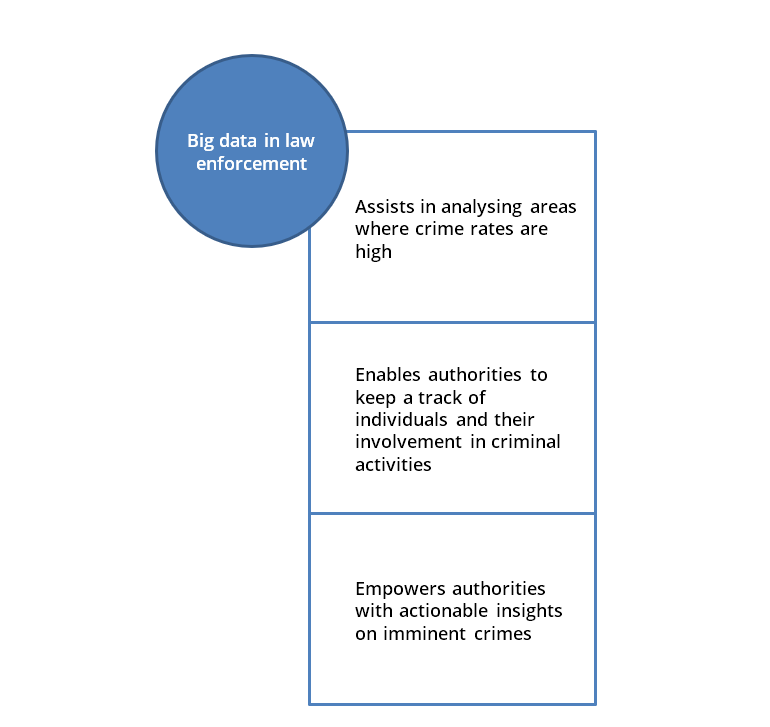Comments
- No comments found

Big data in law enforcement shall empower authorities with actionable insights, ensuring the safety of human lives by minimizing crimes.
Law enforcement agencies are crucial for the safety and well-being of citizens. Law authorities are always in pursuit of minimizing the crime rate. Increase in crime rates is directly reflects the failure of law enforcement authorities. Cyber crimes, social media bullying, domestic violence, and gun violence are some common crimes affecting just so many in any country today, and law enforcement authorities are expected to find a way out of all these. With the incarceration rates reaching 666 per 100,000 people in the US, law enforcement agencies are taking to technology to assist them in their task to ensure security and law enforcement for all. Numerous organizations are leveraging big data analytics as this technology focuses on providing actionable insights that can help enhance productivity and improve customer experience. Big data in law enforcement can be just the technology that can help the law enforcement authorities achieve all this and so much more.

When a law enforcement agency gets an update on crime in an area close by, they try to reach their at the earliest. When a legal authority arrives at the given coordinates, the offense is often already committed. The failure to arrive and act on time leads to unrest among civilians. As a result, the law enforcement agencies have started searching for ways to reach a location before a criminal act takes place. Ever since big data analytics empowers enterprises with actionable insights, law enforcement agencies started looking out for ways this technology can help in maintaining law and order.
Big data is known as the information arriving from numerous sources and differs in formats. As big data is continually changing, law enforcement authorities hold ample information on which analytics is applicable. Analytics holds the potential to inform authorities about possible crimes that can take place in their vicinity.
By using big data analytics, authorities can keep a check on history sheeters for their activities and track a possibility of them re-indulging in criminal activities. When an agency gets a red flag for an individual, they can ensure that the perpetrator does not succeed in his motive of disrupting the efficient functioning of law and order.
Leveraging drones for law enforcement eases out the job as well as makes it more effective too. Big data in law enforcement is one of those technologies that can assist authorities to reach a location well in time to stop a crime, before the crime is committed. Law enforcement heads should now look for ways of hiring individuals with experience in working with analytical software, assisting them in obtaining actionable insights. Along with hiring experts, agencies can also choose to train their officers to work with big data technology to ensure efficient operations.
Naveen is the Founder and CEO of Allerin, a software solutions provider that delivers innovative and agile solutions that enable to automate, inspire and impress. He is a seasoned professional with more than 20 years of experience, with extensive experience in customizing open source products for cost optimizations of large scale IT deployment. He is currently working on Internet of Things solutions with Big Data Analytics. Naveen completed his programming qualifications in various Indian institutes.
Leave your comments
Post comment as a guest